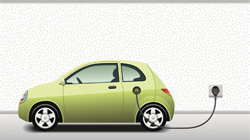Electric cars that go farther for less
The transport sector is planning a transition from conventional fuel-powered vehicles to all-electric ones to reduce dependence on fossil fuels and decrease emissions affecting global climate change. However, this transition will take time. In the meantime, advanced plug-in hybrids and EVs with range extenders are excellent short- to mid-term options to enable battery recharging over long trips or in areas where recharging stations are not available. However, there are currently no such engines on the market that comply with the 'zero emissions' label of EVs. The EU-funded project 'Multi-fuel range extender with high efficiency and ultra low emissions' (FUEREX) sought to meet these stringent requirements including noise, vibration and harshness (NVH) criteria, all at an attractive price. The state-of-the-art range extender for EVs is designed for use with three different compact spark-ignition engines. Thus, the technology covers solutions ranging from sub-compact passenger cars to light-duty commercial vehicles. In addition, the system is designed for multi-fuel flexibility. Each of the three engines is compatible with at least one conventional fuel and at least one biofuel. Bench tests demonstrated successful results in terms of emissions, efficiency and performance. The range extenders were integrated in three test vehicles, two compact passenger cars and one light-duty transport vehicle, with state-of-the-art battery packs. Vehicle testing produced promising results regarding performance and challenging NVH issues. Finally, the team produced design guidelines elucidating range extender optimisation procedures for a given vehicle. Commercial availability of low-cost, high-performance range extenders for EVs is likely to produce a step-change in the number of such vehicles on the road, with corresponding positive impact on manufacturers, the EU economy and the environment.

